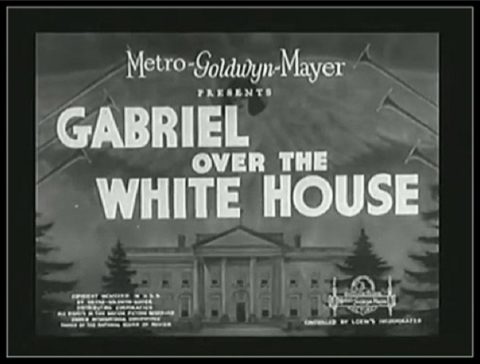Jack Cashill found this “gem” while watching Turner Classic Movies during the Wuhan Coronavirus lockdown and was amazed:
By now, I have seen most of TCM’s movies, but one aired this past week I had not even heard of. On a whim, I DVR’ed it. Good move. Called Gabriel Over the White House, this 1933 liberal wet dream proved to be the most unapologetic celebration of fascism ever put on film.
I watched it wide-eyed. The movie opens with the inauguration of Jud Hammond. A laissez-faire back-slapper, Hammond sees the White House as a way to enrich himself and reward his cronies, Depression be damned. The audience assumes Hammond is a Republican.
Out joyriding one day, Hammond crashes his car and lapses into coma. While still comatose, the Angel Gabriel visits Hammond and turns him into a committed and caring progressive. Is there another kind?
Upon waking, Hammond convenes his cabinet of corrupt self-servers and rejects their plea that the party must come first. Instead, Hammond insists their first priority be the American people. He refuses to use the U.S. Army against a marching mass of the unemployed and fires the secretary of state when he objects.
“I suggest you read the Constitution of the United States. You’ll find the President has some power,” Hammond warns his cabinet members. Some power? Fully indifferent to the Constitution, Hammond grabs all the power that can possibly be grabbed.
When the cabinet objects to his usurpation of power, Hammond fires the cabinet. When Congress threatens to impeach Hammond, he declares martial law and dispenses with Congress. When accused of being a dictator, Hammond argues that his is a dictatorship based on some imagined Jeffersonian principle of Democracy, namely the greatest good for the greatest number of people.
Now with total power, Hammond enacts a national banking law, stops foreclosures, provides direct aid to some 55 million farmers, circumvents private industry and launches his own “Army of Construction.”
A young aide, Hartley Beekman, and his female counterpart, Pendie Molloy, serve as something of a progressive chorus. “The way he thinks is so simple and honest that it sounds a little crazy,” says Beekman of Hammond.
“He’s doing the things you wanted,” Molloy answers. “And If he’s mad, it’s a divine madness. Look at the chaos and catastrophe sane men have brought about.”
The divine madness includes the creation of a Federal Police force, a subset of the Army, with young Beekman at its head. When the nation’s chief racketeer refuses to go back to his unnamed home country, Hammond warns him that the government is about to “muscle in on his racket” and federalize the sale of alcohol.
The racketeer fights back, and Beekman employs a legion of tanks Waco-style against the racketeers. When captured, the racketeers are all hauled before a three-man court martial headed by Beekman, promptly declared guilty, and executed en masse by a firing squad.
Several years ago, the movie was brought to my attention and I found this clip on YouTube that I suspect captures the essence of the film:
James Lileks describes it as “a remarkable movie. And I don’t mean ‘astonishingly good, technically superb, visually ingenious.’ I mean utterly insane.”




